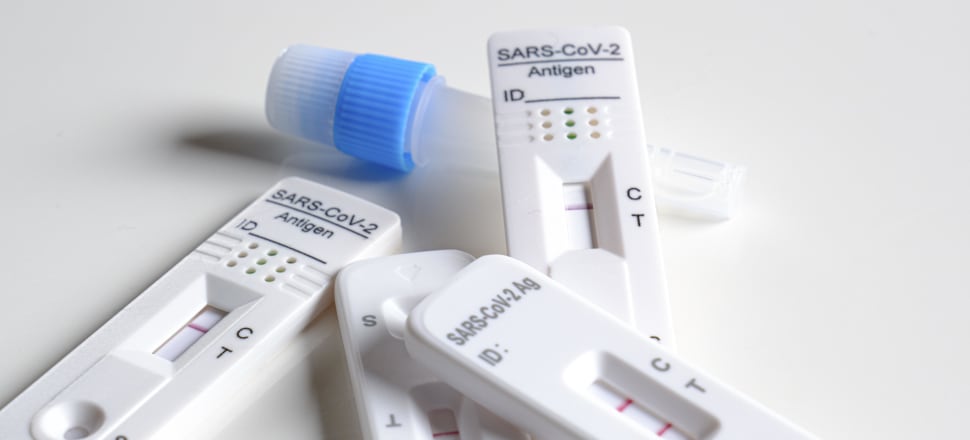
The Ministry of Health withheld advice that could have detected more Covid-19 cases specifically because they did not want asymptomatic cases to be found, Marc Daalder reports
Health officials said asymptomatic testing could help to cut Covid-19 transmission but opposed recommending it because it could reduce "the available workforce" if people discovered they had the virus.
University of Auckland microbiologist Siouxsie Wiles said it was "not surprising but it's also astonishing to see it in black-and-white" that the Ministry of Health had withheld advice that may have protected vulnerable people.
The decision came in late July as top health officials sitting on the Covid-19 Protection Framework Assessment Committee conducted their regular review of traffic light settings. At the time, cases in the BA.5 wave were just starting to come down but a record number of people were dying each day. We now know Covid-19 killed more people in three weeks in July than died on New Zealand's roads in an average year.
READ MORE * Cabinet scrapped masks against health advice * Newsroom's up-to-date daily Covid-19 case charts
Alongside other settings, the committee considered whether to recommend or require taking a RAT for those who were non-household close contacts of a Covid-19 case or who were visiting a vulnerable person.
"In either situation, the committee is of the view that it would not be appropriate to either recommend or require testing. The rationale for this is that both options may identify asymptomatic cases - an approach not recommended in the Testing Plan," officials wrote in the briefing, released under the Official Information Act.
They conceded it would reduce transmission but said potential drawbacks included "additional people being (temporarily) taken out of the available workforce. Although from a science perspective having fewer potentially infectious people at work could reduce workforce pressures, these people may be late in the course of their infection."
Wiles said these concerns were "a false economy" because asymptomatic or pre-symptomatic cases who went to work would likely infect their co-workers and lead to a greater workforce shortage than if they had just stayed home.
The committee also worried people who tested negative on a RAT might not take other precautions when visiting a vulnerable family member like social distancing or masking. While RAT results correlate very closely with infectiousness, it can take a day or two after the start of the infectious period for a positive test to occur.
Dion O'Neale, of Covid-19 Modelling Aotearoa, said the documents were "really disappointing". While the Government talks about establishing a culture of mask-wearing that could last beyond the pandemic, O'Neale says a similar culture of testing could help ensure events go ahead without becoming superspreaders.
"This is something we've used for some of our own meetings, is to ask people to please do a RAT before you show up each day, because we know that we're going to have a bunch of people in a room and you can open the windows and doors but that's not perfect," he said. "We have picked up a few people who didn't know they were infected and as a consequence we're not aware of any onward transmission at these events."
It was also recommended to test before indoor events with a lot of eating, drinking, talking and singing or before visiting a vulnerable family member.
"As a personal example, I've got a relative who is severely immunocompromised due to cancer issues. Before I go and see him, I make sure I do a RAT because I don't want to be asymptomatic and showing up infectious," O'Neale said.
He added asymptomatic and pre-symptomatic people are still able to spread Covid-19, a fact a Ministry of Health spokesperson agreed with. Detecting and isolating these cases therefore still has significant benefits in reducing onward transmission.
Emily Harvey, also of Covid-19 Modelling Aotearoa, added that this sort of pre-event testing can also catch people who recently had Covid-19 and are still infectious. Modellers and health experts have been pushing for months for the Government to adopt a test-to-release policy which would allow most people to exit isolation earlier than seven days if they test negative but also keep the few people who are infectious longer for a week in isolation until they're no longer contagious.
As the Covid-19 response has moved from a centralised government-run affair to an environment of individual risk assessment, O'Neale said it was critical people be empowered to actually make informed assessments.
"If your approach relies on individuals making the right decisions, then those individuals have to have the right information to make those decisions," he said.
"Let's be honest, a positive test result is for the best part saying you are infectious. It's not just a positive result, it's a 'you are infectious' result. I can't imagine any situation where you think it's good for people to be less informed."
A spokesperson for the Ministry of Health said the agency stands by its July advice.
"The vast majority of people who are asymptomatic will not have Covid-19. Public health measures need to be proportionate to risk posed," they said.
"The focus on identifying all cases was a feature of elimination strategy in the earlier stage of the Covid-19 pandemic. With high level of vaccinations, hybrid immunity and access to antivirals, the Covid-19 response is focused on managing the impacts of Covid-19. The vast majority of people who are asymptomatic will not have Covid-19 or be infectious with Covid-19."
The spokesperson said the members of the committee which decided to withhold the information were the head of the Public Health Agency Andrew Old, the ministry's principal advisor on Pacific health Jo Williams, the deputy directors of public health Harriette Carr and Richard Jaine, the Chief Science Advisor Ian Town, the head of the Māori Health Directorate John Whaanga, the Strategy, Policy and Legislation head Maree Roberts, the Te Whatu Ora public health lead Vince Barry and Martin Chadwick, the Chief Allied Health Professions Officer.







